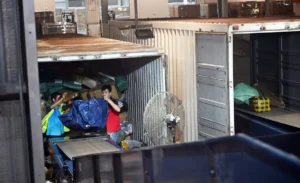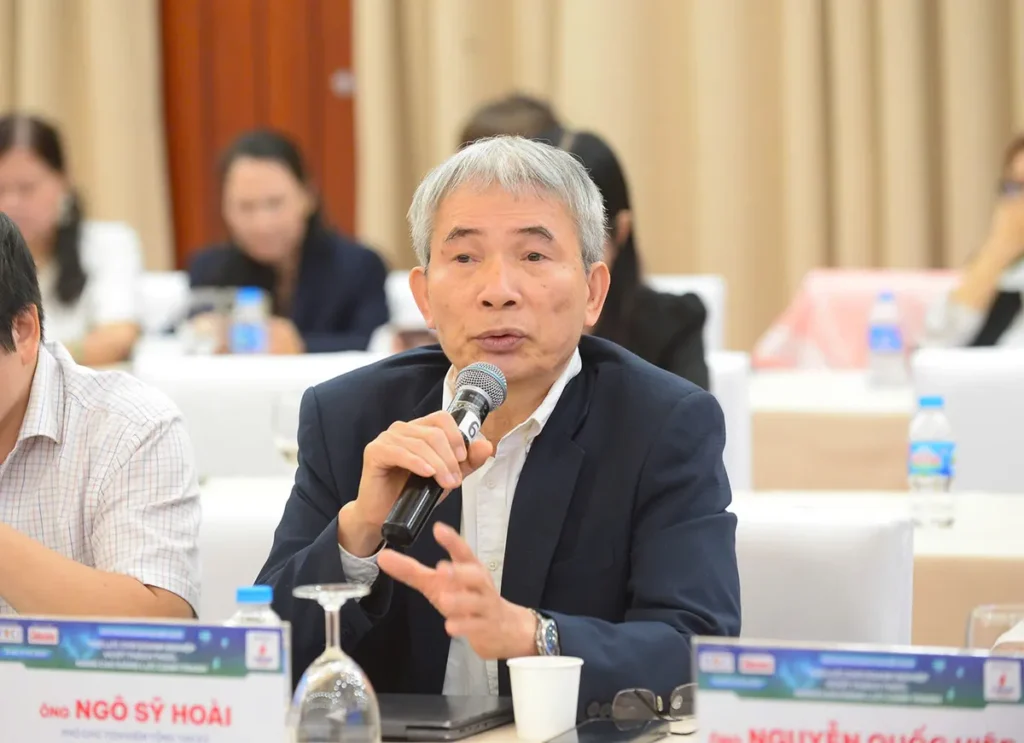A representative of the Vietnam Timber and Forest Products Association emphasized that with the impact of reciprocal taxes, businesses need to focus on quality instead of quantity of growth.
“Don’t put all your eggs in one basket”
Speaking at the 2025 Business Forum with the theme “Supporting businesses to overcome challenges and improve competitiveness”, Mr. Ngo Sy Hoai – Vice President and General Secretary of the Vietnam Timber and Forest Products Association said that through the recent reciprocal tax event, it can be seen that the self-reliance and resilience of many major export industries such as footwear, seafood, wood, electronics, etc. are very weak.
“We are growing mainly in breadth, relying on low-cost inputs. Including low-cost labor and relatively cheap input materials. Especially the wood industry – a highly labor-intensive industry – is still relying on these two advantages,” Mr. Hoai assessed.
According to Mr. Ngo Sy Hoai, we export a lot but mainly take labor as profit. For example, with only a 10% tax ceiling from the US Government, wood businesses have had to negotiate with partners.
“Partners often respond by “cutting it in half”, each side bears a little. But how can businesses with interest rates usually below 5% bear it? Not to mention the tax rate of 46%,” said a representative of the Vietnam Timber and Forest Products Association.
In addition, Mr. Ngo Sy Hoai said that Vietnamese export enterprises are “putting too many eggs in one basket”. Accordingly, Vietnam exports “Made in Vietnam” products to more than 200 markets, of which the wood industry alone exports to more than 160 markets.
However, in 2024, wood products exported to the US market will account for more than 56%. That means if we make 10 chairs, nearly 6 will be exported to the US. And just a few anti-dumping and anti-subsidy investigations by the US will immediately cause wood businesses to lose their ability to cope and may face liquidity problems.
Regarding solutions in the coming time, Mr. Ngo Sy Hoai emphasized that businesses need to prioritize growth quality over quantity. As with the wood industry, businesses can do less but must increase the portion they enjoy and increase the profit margin.
“Businesses that “don’t put all their eggs in one basket”, export to many markets, and both export and domestic markets can withstand the tariff shock well,” said Mr. Hoai.
Need mechanism for business growth
Meanwhile, Mr. Nguyen Quoc Hiep – Chairman of the Vietnam Association of Construction Contractors (VACC) talked about the importance of mechanisms to support businesses.
According to Mr. Hiep, in 2025, public investment will reach 97 billion USD. If construction enterprises are deeply involved in public investment projects, this will be a greater opportunity. For example, the North-South high-speed railway project has a total investment of more than 67 billion USD, expected to start construction at the end of 2026, with 1,541 km of railway, 21 provinces and cities with stations, the construction part alone accounts for about 40 billion USD.
“With 1,541 km of high-speed railway with a total investment of 67 billion USD, if divided into about 20 bidding packages, each bidding package would cost about 2 billion USD, equivalent to more than 50,000 billion VND,” Mr. Hiep emphasized that this is a great opportunity but said that this is also a big challenge. Because in order to be able to receive the bid, businesses must ensure financial capacity.
Mr. Hiep suggested that the Government have a solution to divide the bidding packages so that Vietnamese enterprises can do it. The division of enterprises will organize a mechanism of combining contractors – that is, 5-6 contractors will have one main contractor, the rest will cooperate with each other.

“We recommend handing over all construction to domestic enterprises, or even appointing contractors. Instead of domestic enterprises acting as subcontractors for foreign companies,” said the Chairman of the Vietnam Association of Construction Contractors.
In addition to the mechanism, Mr. Hiep also said that it is necessary to promote administrative procedure reform. Many current procedures still require 5-6 seals, causing businesses to waste time and money. Mr. Hiep suggested reducing it to one seal and improving the process of receiving opinions on law making, in order to increase transparency and suitability to reality.
Regarding this issue, speaking at the Forum, Vice President of the Vietnam Federation of Commerce and Industry (VCCI) Hoang Quang Phong said that according to a nationwide survey, only 32% of businesses said they would expand production and business in the next 2 years.
Although there are nearly 1 million businesses in operation, with a large number of businesses losing confidence in the market as it is now, the goal of reaching 2 million businesses by 2023 is a huge challenge.
The business community still faces many difficulties and challenges in production and business activities due to many adverse impacts of objective context, geopolitical conflicts, and disruptions in supply chains and input materials.
Therefore, in order to make a breakthrough in 2025, reforming economic institutions, improving the business environment, promoting and supporting enterprises will help improve the ability of enterprises to absorb capital, enhance competitiveness to gradually master core technology, and penetrate deeper into the global value chain.
















